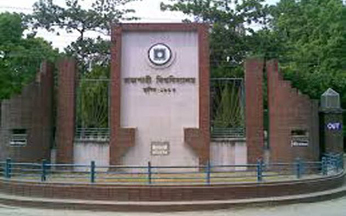RAJSHAHI, March 21, 2018 (BSS)-The nine-month War of Liberation waged by the people of Bangladesh in 1971 will forever remain as one of the most glorious chapters in human history.
The sovereign and independent People’s Republic of Bangladesh, as it stands today, is the outcome of an arduous struggle of the people under the leadership of Bangabandhu Sheikh Mujibur Rahman.
An entire 70 million people, inspired by the great leader, rose in arms against the military junta of Pakistan when years of political persuasion failed to secure a place of honor and justice for the Bangalees in that country.
The Rajshahi University (RU) had a vital and glorious role in the liberation war. A good number of the university teachers, students and officials made supreme sacrifice in the war. The RU authorities have set up several monuments and a museum in memory of the martyrs.
In 1972, the authorities established Shaheed Smriti Sangrashala which is the first museum of the country on the liberation war, said Prof Ananda Kumar Shaha, Pro-VC of RU.
There are three galleries in this museum. The galleries begin with covering the early history of Bangladesh.
A major section records the events of the Language Movement for the recognition of the Bangla Language in Pakistan, which is regarded as the beginning of the movement for Bangladesh’s independence.
The coverage of the liberation war includes the training and operations of the Mukti Bahini, the guerrilla army built by the Awami League to resist Pakistani forces.
Several galleries focus on the genocide carried out by the Pakistani army against the Bengali population, with Operation Search light targeting Bengali intellectuals, students, Hindus and Awami League leaders, and the humanitarian crisis created with the pouring of an estimated 10 million refugees into neighboring India.
The museum also preserves the memories of Professor Dr Samsuzzohha along with the other teachers of Rajshahi University who sacrifices their lives for the country.
The galleries display the weapons used by the Mukti Bahini, personal effects of many Mukti Bahini fighters and civilian victims of the atrocities committed by Pakistani forces, many donated by their families after the conflict.
Also displayed are remains of human skulls and bones retrieved from mass grave of civilians killed by Pakistani forces.
Apart from this, five teachers of Rajshahi University- Dr Abdul Bari, Dr Golam Saqlain, Azizul Huq, Shaikh Ataur Rahman and Abdur Rahim Joardar- were given compulsory leave after being charged with collaboration, the RU sources said.
Six other teachers- Mukbul Hussain, Ahmed Muhammad Patel, Solaiman Mondol, Unman Bari Baghi, Zillur Rahman and Kalim A Sasrami- were arrested on charges of collaboration.
Two teachers-Ahmed Ullah Khan and Ebne Ahmed-were charged with collaboration and fled away after independence, the sources added.



